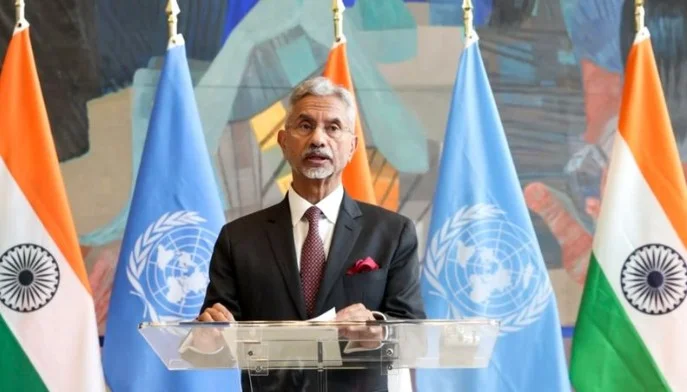NEW YORK, July 1 — External Affairs Minister S. Jaishankar on Monday condemned the April 22 terror attack in Pahalgam as an “act of economic warfare” aimed at crippling Kashmir’s tourism economy and inciting communal violence. Speaking during a conversation with Newsweek CEO Dev Pragad at the magazine’s Manhattan headquarters, Jaishankar emphasized that India would not remain passive in the face of cross-border terrorism — even under the threat of nuclear escalation.
“This was meant to destroy tourism in Kashmir, which is the backbone of its economy,” Jaishankar said, referring to the attack that killed 26 civilians and was claimed by The Resistance Front (TRF), a proxy of Pakistan-based Lashkar-e-Taiba. “People were asked to identify their faith before they were killed. It was a calculated act of terror.”
Calling the Pahalgam attack a turning point, Jaishankar declared that India had reached a limit. “There was a very strong sentiment across the country that enough is enough. We will not allow terrorists to operate with impunity simply because they are across the border.”
He further stated that Operation Sindoor, India’s retaliatory strike against terror infrastructure in Pakistan and Pakistan-occupied Kashmir, directly targeted the operational hubs of known terror groups. “These are not hidden outfits. Everyone knows the headquarters of Organisation A and Organisation B — and those are the ones we destroyed.”
Jaishankar, currently on an official visit to the U.S., will next attend the Quad Foreign Ministers’ Meeting in Washington, D.C. He began his trip by inaugurating a UN exhibition titled The Human Cost of Terrorism, organized by India’s Permanent Mission to the UN.
During his remarks, Jaishankar addressed global complacency toward terror groups based in Pakistan. “These terrorists do not operate from caves,” he said. “They have buildings, signboards, even websites. They are not hiding.”
India, he stressed, would no longer be deterred by threats of nuclear escalation. “We’ve heard it too often — that because both India and Pakistan are nuclear-armed, India must exercise restraint,” Jaishankar said to applause. “Well, we are not falling for that anymore. No more impunity for terrorists. No more free pass for the governments who fund and support them. No more nuclear blackmail.”
He added: “If they come and do things to us, we will go and hit those who did it. We will do what we have to do to defend our people.”
Jaishankar also traced the roots of Pakistan-sponsored terrorism back to the 1947 invasion of Kashmir. “They were described as tribal raiders, as proxies. But soon, the Pakistani Army followed. For decades, we’ve battled this — from the 2001 Parliament attack to the horrors of 26/11 in Mumbai.”
Responding to a question about former U.S. President Donald Trump’s claim that he used trade negotiations to de-escalate recent India-Pakistan tensions, Jaishankar dismissed any suggestion that such comments had impacted bilateral trade talks. “The trade negotiators are focused on what they should be — numbers, products, tariffs. I don’t believe those remarks have influenced the process.”
He went on to recount the tense hours preceding Operation Sindoor, saying he was present when U.S. Vice President JD Vance warned Prime Minister Narendra Modi on May 9 of a looming “massive assault” from Pakistan.
“The Prime Minister was unmoved by the threats. On the contrary, he made it clear that there would be a response,” Jaishankar said. “That same night, they attacked. And shortly after, we responded.”
According to Jaishankar, the very next morning, Secretary of State Marco Rubio contacted him to say Pakistan was ready to talk. “I can only tell you what I personally witnessed. The rest, I leave to you.”
He concluded with a message to the global community: “Terrorism is not a local problem. It is a threat to everyone. There must be zero tolerance — no excuse, no justification, and no state support under any guise.”

